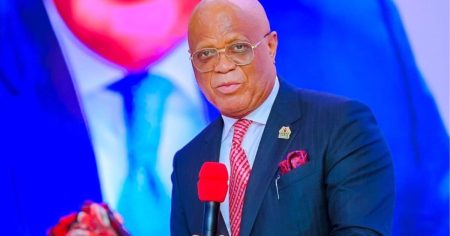Paragraph 1: Inauguration of NNPC Limited Board
Seven weeks after their initial appointment on April 2, 2025, President Bola Tinubu formally inaugurated the board and management of the Nigerian National Petroleum Company Limited (NNPC Limited) in a ceremony held at the Aso Rock Villa in Abuja. This marked a significant step in the ongoing transformation of Nigeria’s oil and gas sector, with the newly appointed members assuming their roles to steer the company towards greater efficiency, transparency, and profitability. The swearing-in ceremony was attended by prominent government officials, including the Minister of Finance and Coordinating Minister of the Economy, Wale Edun, the Minister of Information and National Orientation, Mohammed Idris, and the Minister of State for Petroleum (Oil), Heineken Lokpobiri. The event underscored the importance the Tinubu administration places on the petroleum sector and its contribution to the nation’s economic development.
Paragraph 2: Leadership and Board Composition
Ahmadu Kida, appointed as the Non-Executive Chairman of the board, and Bashir Ojulari, the Group Chief Executive Officer of NNPCL, were formally sworn in by President Tinubu. The 11-member board comprises individuals selected to represent diverse regions and expertise. Representing the North West geopolitical zone are Adedapo Segun and Bello Rabiu, while Yusuf Usman represents the North East. Babs Omotowa, a former Managing Director of the Nigeria Liquefied Natural Gas (NLNG), represents the North Central. Austin Avuru, a seasoned industry veteran, serves as the Non-Executive Director for the South-South, with David Ige representing the South-West and Henry Obih representing the South-East. The board also includes government representation, with Lydia Jafiya, Permanent Secretary of the Federal Ministry of Finance, and Aminu Ahmed representing the Ministry of Petroleum Resources. This diverse representation aims to ensure a balanced and comprehensive approach to the company’s strategic direction.
Paragraph 3: The Significance of NNPCL’s Transformation
The transition of NNPC from a government corporation to a commercially-oriented limited liability company, NNPCL, represents a pivotal moment in Nigeria’s petroleum industry. This transformation is intended to enhance the company’s operational efficiency, attract investment, and foster greater transparency and accountability. By operating under the Companies and Allied Matters Act (CAMA), NNPCL is expected to function more like a private sector entity, driven by market forces and commercial considerations. This shift aims to unlock the full potential of Nigeria’s vast oil and gas resources, contributing significantly to the nation’s economic growth and prosperity.
Paragraph 4: Expectations and Challenges for the New Board
The newly appointed board faces a range of challenges and expectations. They are tasked with navigating the complex dynamics of the global oil and gas market, including fluctuating oil prices and the growing emphasis on renewable energy sources. The board must also address issues of operational efficiency, cost optimization, and revenue generation. Furthermore, they are expected to foster a culture of transparency and accountability within the company, ensuring that NNPCL operates in a manner that benefits all stakeholders, including the Nigerian people. Balancing these competing priorities will require strategic vision, sound management practices, and a commitment to the long-term success of the company.
Paragraph 5: Strategic Priorities for NNPCL
Key strategic priorities for NNPCL include increasing oil and gas production, optimizing refining capacity, and expanding into the downstream petrochemical sector. The company must also focus on developing its gas resources, recognizing the growing importance of gas as a cleaner and more sustainable energy source. Investing in infrastructure, technology, and human capital will be crucial for achieving these objectives. Furthermore, NNPCL must prioritize environmental sustainability, implementing measures to minimize the environmental impact of its operations and contribute to a cleaner energy future. Successfully executing these strategies will be critical for NNPCL’s long-term growth and profitability.
Paragraph 6: The Role of NNPCL in Nigeria’s Economic Development
NNPCL plays a vital role in Nigeria’s economic development. As the country’s national oil company, it is responsible for managing and developing the nation’s vast oil and gas resources, generating revenue for the government, and creating employment opportunities. The company’s success is directly linked to the overall economic well-being of the country. The new board and management are entrusted with maximizing the value of Nigeria’s petroleum resources, contributing to economic diversification, and promoting sustainable development. Their leadership will be instrumental in shaping the future of Nigeria’s energy sector and its contribution to the nation’s prosperity.














